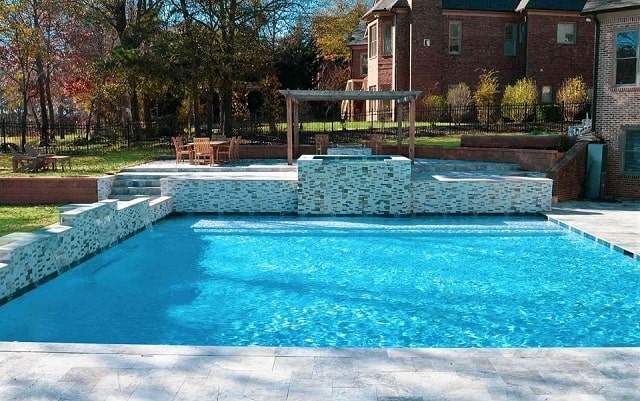Standing water has the potential to grow bacteria. So, sanitising and keeping pool water clean is vital to ensure a safe and enjoyable swimming experience. There are multiple options for pool sanitisation, including chlorine, salt, and freshwater pools.
Unlike what many people think, all these pools use chlorine to sanitise the pool water. But there’s a difference in how the chlorine is delivered into the pool. Here’s a closer look at the different pool sanitisation systems to help you know which is best: chlorine, salt, or freshwater pools?
Chlorine Pools
These have long been the standard and the most popular pool sanitisation system. Chlorine pools require adding store-bought chlorine to the pool water as needed. The chlorine breaks down into various chemicals, killing bacteria, viruses, and algae in the water.
But as you add in more chlorine, the free chlorine reacts with organic substances in the pool, like sweat and body oils, thus forming chloramines. You will need more chemicals in the water to get rid of the chloramines.Note that chlorine pools need regular testing to ensure a proper chemical balance.
Pros
– Much more common; thus, easier to install and find information on maintenance and repair
– Lower upfront cost
– Chlorine doesn’t damage fixtures
– Chlorine is effective at disinfecting pool water
Cons
– Chlorine is harsh on the eyes, skin, and hair
– It has a strong smell
– Requires a steady supply of expensive chemicals to keep the pool sanitised
Saltwater Pools
Saltwater pools rely on a salt chlorine generator. This machine breaks down salt in the water to generate chlorine via electrolysis. The chlorine is then released into the pool water to sanitise it, which occurs repeatedly.
Saltwater pools don’t require you to add chlorine every few days, thus reducing the number of chloramines. Also, since you’re not continuously adding chemicals to the pool, the water has a more stable pH. As a result, the water is softer and gentler on the skin.
It’s important to note that saltwater pools don’t have a high salt concentration like ocean water. Therefore, swimming in them won’t leave you with that salty or sticky feeling you’d get swimming in the ocean.
On the downside, fewer people have saltwater pools, meaning less information about them. Finding spare parts or experts to repair and maintain the machine might be a problem.
Pros
– The water feels soft
– No chloramines, which are responsible for causing itchy skin, red eyes, and bad smell
– Fewer chemicals
– Save money on chemicals
– They require less maintenance compared to chlorine pools
Cons
– Salt is corrosive and can damage parts of the swimming pool and fixtures
– They require a higher initial investment than traditional chlorine pools
– They are more complex and will require a licensed, specialised technician in case of any problems
– The generator can break or need replacing anytime
Freshwater Pools
A freshwater pool is a term used by the industry to differentiate conventional and saltwater pools. So, no, it doesn’t mean the pool water is pure or chemical-free. As mentioned earlier, all swimming pools must undergo some form of sanitisation to make them safe for use.
Freshwater pools are similar to chlorine pools in that you manually add tablets, granules, or liquid chlorine into the pool water. But you can minimise the chemicals you add to your pool.
Every time you add chlorine or hydrogen peroxide, a stabiliser, or other chemicals to the water, you increase dissolved solids. The EPA states that if a swimming pool contains over 500 parts per million of Total Dissolved Solids, it can’t be classified as freshwater.
Pros
– Creates a more crystal clear, healthier swimming pool
– Better for the environment
– They have a lower installation cost
– Low chlorine levels, which make the water less harsh and less smelly
Cons
– You must regularly chlorinate to keep the water clean and safe
– Some might not hold the correct levels of chlorine in the pool, thus missing out on the above benefits
Know more: Tips for Staying Safe with Pool Chemicals
Conclusion
Deciding between chlorine, salt, and freshwater pools depends on your personal preference and needs. Saltwater pools are worth considering if you have the money and sensitive skin. However, they are complex. Chlorine and freshwater pools may require expensive chemicals, but these sanitization systems have stood the test of time.


